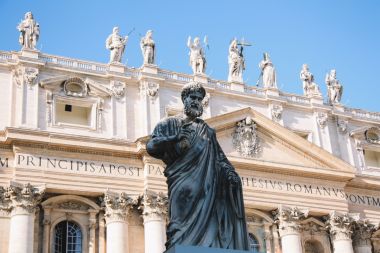Abuse experts look to coming synod to promote accountability on abuse

Abuse prevention experts gathered in Rome said Thursday that the Synod on Synodality's potential to reform power structures and promote dialogue could also improve abuse prevention and accountability in the Catholic Church.
The Synod on Synodality, launched by Pope Francis in 2021, has sought out the views of Catholics all over the world on the church's power dynamics and decision making.
On Tuesday, the Vatican presented a document that will form the agenda for the synod, detailing the major issues raised by the faithful in meetings on the parish level. Among those issues was the need for stronger accountability measures to address the clerical abuse crisis.
Bishops and lay representatives will meet at the Vatican in October to discuss these topics, but ancillary discussions have already begun. The four-day conference at the Pontifical Gregorian University in Rome this week brought together advocates with academics from the fields of theology, sociology and anthropology to talk about safeguarding children.
More than 200 participants took part in small working groups, adopting the approach the synod will follow this fall. The spirit of synodality also inspired the willingness to bring to light issues that are usually considered taboo in many cultures.
The International Safeguarding Conference, with the theme of "Sustaining Organizational Accountability," was organized with the Institute of Anthropology, which supports training for missionaries and others about child abuse and protection.
"Opening the dialogue around the very concept of synodality is getting the whole church involved in saying, 'OK, how do we solve this together?'" said Canadian Archbishop Paul-André Durocher of Gatineau during a closing news conference on Thursday.
Durocher said that he sometimes encounters a certain "resistance" on the part of clergy and lay faithful when addressing abuse prevention. In particular, Archbishop Simon Poh of Kuching, Malaysia, told reporters, "people in Asia are generally silent when it comes to questions of abuse," attributing the silence to a culture that places more importance on the community and society than on personal needs.
Attention to abuse is changing, however, Poh said. "I was alone when talking about safeguarding," Poh said, citing a mentality that saw abuse as a problem chiefly in the West. "But now my bishops' conference and religious congregations are with me," having realized, he said, "that abuse is not a Western problem, it is a human problem."
The hope among the organizers is that the synod will increase awareness by also examining the role of bishops and how they relate to their dioceses and the Vatican. "Accountability requires structures of accountability and we are working on that in the church more and more," Durocher said.
The Rev. Hans Zollner, who heads the Institute of Anthropology at the Gregorian University, said there is a "need to rethink the role of the bishop" also in relation to theology and canon law. While the church under Pope Francis has adopted many laws that regulate punishments and responsibilities in cases of abuse, "what is not there is the sustainability in the application of these norms."
The patchwork application of accountability measures shows that "norms don't suffice," Zollner said. "What we need more is a change in attitude, which is unfortunately not done in a year or five. It takes years or generations."
According to Jörg M. Fegert, a trauma researcher at the University of Ulm in Germany, Catholic institutions' response is still greatly lacking. "Something that has to change in the way these cases are dealt with is the openness," he said at the news conference. He said decades of a lack of transparency created "a crisis of trust."
"There was an endemic injustice toward victims. Some of the victims were discredited in public. Victims are part of the church in a synodal church, signaling that the church works together with the victims," Fegert said.
While leaving the reform of church power structures to the upcoming synod, participants at the conference joined together to sign a declaration urging leaders "to promote and nurture accountability." The experts recognized the many improvements made by church institutions so far but made clear "that significant room for improvement still exists."
© Religion News Service











